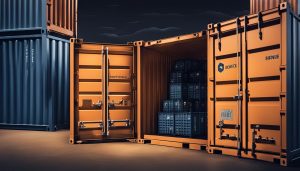Docker is an open platform that revolutionizes the development, shipping, and running of applications in technology. It simplifies workflows, ensures consistency, and enhances application development and deployment possibilities.
At the heart of Docker’s architecture lies the Docker Daemon. But what exactly is a Docker Daemon? Let’s dive deeper into this essential component and explore its features, benefits, architecture, and components.
Key Takeaways:
- A Docker Daemon is a critical component of the Docker platform.
- Docker separates applications from infrastructure, streamlining the development lifecycle.
- It enables responsive deployment and scaling, optimizing resource utilization.
- Docker Compose simplifies the management of container sets.
- Overall, Docker empowers developers and system administrators to achieve cost-effectiveness, efficiency, and enhanced security in application development and deployment.
Understanding Docker’s Core Functions and Features
Docker, as an open platform, offers various core functions and features that make it an essential tool for application development and deployment. Let’s explore some of the key elements that contribute to Docker’s effectiveness and efficiency.
Docker Packages Applications:
One of the primary functions of Docker is its ability to package applications in containers. These containers provide isolation, security, and the ability to run multiple applications simultaneously. By separating applications from the underlying infrastructure, Docker ensures consistent deployment and easier application maintenance. This packaging mechanism allows developers to focus on the code and dependencies of their applications without worrying about compatibility issues with the target environment.
Docker Streamlines the Development Lifecycle:
With its containerization technology, Docker streamlines the entire development lifecycle. It enables developers to build, test, and deploy applications quickly and efficiently. By minimizing the dependencies and configurations required for each application, Docker reduces the risk of conflicts and simplifies the development process. Additionally, Docker’s support for continuous integration and continuous delivery workflows allows for faster and more reliable deployments, ensuring a smooth and efficient development cycle.
Docker Enables Responsive Deployment:
Docker’s responsiveness in deployment is another crucial feature. By leveraging containerization, Docker enables applications to run consistently across various environments, including development, testing, and production. This flexibility allows for seamless deployment and scaling, ensuring that applications perform optimally regardless of the underlying infrastructure. Docker’s client-server architecture, with the Docker daemon and client, facilitates efficient management and deployment of Docker containers, providing a user-friendly interface.
Docker Compose for Application Deployment:
To simplify the deployment of complex applications composed of multiple containers, Docker Compose comes into play. Docker Compose allows developers to define and manage multi-container applications using a YAML file. It facilitates the creation of scalable and reproducible deployment environments, making it easier to share and collaborate across teams. With Docker Compose, developers can orchestrate the configuration and deployment of interconnected containers, further enhancing the efficiency and productivity of the application development process.
A Comprehensive Overview
In summary, Docker’s core functions and features provide developers and system administrators with a powerful toolset for application development and deployment. Docker’s ability to package applications, streamline the development lifecycle, enable responsive deployment, and leverage tools like Docker Compose make it an invaluable resource in optimizing resource utilization, ensuring consistent application environments, and simplifying workflows. By embracing Docker, businesses can enhance their application development and deployment processes, achieving cost-effectiveness, efficiency, and enhanced security.
Streamlining the Development Lifecycle with Docker
Docker is a powerful platform that streamlines the development lifecycle for businesses. By leveraging Docker, organizations can optimize their development processes, ensuring faster deployment, and easier maintenance. Docker’s ability to support continuous integration and continuous delivery workflows enhances the development process, enabling teams to deliver software more efficiently and reliably.
One of the key advantages of using Docker is its ability to ensure consistent application environments. With Docker, developers can package their applications, along with all the necessary dependencies, into containers. These containers are isolated and provide a consistent environment, regardless of the underlying infrastructure. This empowers development teams to build, test, and deploy their applications with confidence, knowing that the environment will remain consistent throughout the process.
Docker provides efficient container management through Docker Compose. This tool allows developers to define and manage multi-container applications using a simple YAML file. Docker Compose simplifies the deployment of complex application stacks, ensuring that all containers are deployed and connected correctly. It also allows for easy sharing and reproduction of deployment environments, making collaboration between team members seamless and efficient.
Key Benefits of Docker:
- Docker streamlines the development lifecycle, ensuring faster deployment and easier maintenance.
- Docker supports continuous integration and continuous delivery workflows, enhancing the development process.
- Docker ensures consistent application environments, providing confidence in the deployment process.
- Docker provides efficient container management with Docker Compose, simplifying complex application stacks.
Overall, Docker simplifies the development lifecycle, enhances collaboration, and empowers organizations to deliver applications with speed and reliability. By streamlining the development process and ensuring consistent environments, Docker enables teams to focus on innovation and delivering value to their customers.
Docker Enables Responsive Deployment and Scaling
In the world of software development, the ability to quickly deploy and scale applications is crucial for staying competitive. Docker, with its containerization technology, offers a solution that enables responsive deployment and scaling, allowing businesses to adapt to changing demands with ease.
One of the key advantages of Docker is its ability to allow for easy workload management. By encapsulating applications within containers, Docker simplifies the process of deploying and managing software. Containers provide a lightweight and consistent environment, ensuring that applications run smoothly across different platforms and environments.
Furthermore, Docker supports running workloads on various environments. Whether it’s development, testing, or production, Docker provides a consistent and reliable platform for running applications. This flexibility allows developers to seamlessly transition their applications between different environments, ensuring consistent performance and reducing the risk of compatibility issues.
Benefits of Docker’s Responsive Deployment and Scaling
- Improved Time to Market: With Docker, developers can deploy applications quickly, reducing time to market and enabling faster response to market demands.
- Efficient Resource Utilization: Docker’s lightweight containers optimize resource utilization, allowing organizations to run more workloads on the same hardware, ultimately leading to cost savings.
- Scalability: Docker’s ability to scale workloads across multiple nodes using tools like Docker Swarm and Kubernetes ensures that applications can handle increasing demands without sacrificing performance.
In summary, Docker’s responsive deployment and scaling capabilities empower organizations to efficiently manage workloads, seamlessly transition between environments, and optimize resource utilization. By leveraging the power of containers, businesses can stay agile, reduce costs, and effectively respond to the ever-changing needs of the digital landscape.
Cost-effectiveness and Efficiency with Docker
Docker is a game-changer when it comes to cost-effectiveness and efficiency in application development and deployment. By allowing for running more workloads on the same hardware, Docker optimizes resource utilization and reduces hardware requirements, resulting in significant cost savings.
One of the key factors that contribute to Docker’s cost-effectiveness is its ability to separate applications from infrastructure. Traditionally, each application would require its own dedicated server, leading to high hardware costs and underutilized resources. However, with Docker, applications can run within containers, allowing multiple applications to share the same hardware resources. This not only maximizes resource utilization but also reduces the need for additional hardware investments.
Furthermore, Docker’s containerization technology enables efficient and streamlined deployment. Containers are lightweight and have minimal overhead, allowing applications to start and stop quickly. This means faster deployment times and increased efficiency in managing multiple applications. With Docker’s ability to scale workloads based on demand, businesses can dynamically allocate resources as needed, further optimizing resource utilization and reducing costs.
“Docker allows for running more workloads on the same hardware, optimizing resource utilization, reducing hardware requirements, and separating applications from infrastructure.”
In addition to cost savings, Docker’s efficiency also extends to improved security and maintenance. By isolating applications within containers, Docker enhances security by reducing the attack surface and preventing potential conflicts between applications. Moreover, Docker’s modular and standardized approach to application deployment simplifies maintenance and updates, enabling faster troubleshooting and reducing downtime.
In summary, Docker’s cost-effectiveness and efficiency stem from its ability to run more workloads on the same hardware, optimize resource utilization, reduce hardware requirements, and separate applications from infrastructure. By leveraging Docker’s containerization technology, businesses can achieve significant cost savings, enhance resource utilization, and streamline their application deployment and management processes.
Table: Cost Savings with Docker
| Cost Item | Traditional Infrastructure | Docker with Containerization |
|---|---|---|
| Hardware Costs | Higher – Dedicated servers for each application | Lower – Applications running within containers on shared hardware |
| Resource Utilization | Lower – Underutilized resources | Higher – Optimized resource utilization |
| Maintenance Effort | Higher – Managing individual servers | Lower – Standardized deployment and streamlined maintenance |
| Scalability | Lower – Limited scalability options | Higher – Dynamic allocation of resources based on demand |
Conclusion
In summary, the Docker Daemon is a crucial component of the Docker platform that enables the efficient packaging, deployment, and management of applications in containers. With Docker, developers and system administrators can streamline the development lifecycle, support continuous integration and continuous delivery workflows, and achieve responsive deployment and scaling.
Docker’s containerization technology provides isolation, security, and the ability to run multiple containers simultaneously, ensuring consistent application environments and efficient container management. Additionally, Docker Compose simplifies the deployment of multi-container applications, allowing for easy sharing and reproduction of deployment environments.
Overall, Docker empowers businesses to achieve cost-effectiveness, efficiency, and enhanced security in their application development and deployment processes. By separating applications from infrastructure, Docker optimizes resource utilization, reduces hardware requirements, and allows for running more workloads on the same hardware. This brings significant cost savings and improved resource allocation.
In conclusion, the Docker Daemon, along with the entire Docker platform, simplifies workflows, ensures consistency, and opens up new possibilities in application development and deployment. By leveraging Docker’s features and tools, businesses can thrive in a rapidly evolving technological landscape while delivering reliable and efficient applications.
FAQ
What is Docker?
Docker is an open platform that allows for the development, shipping, and running of applications in technology. It separates applications from infrastructure, streamlining the development lifecycle and supporting continuous integration and continuous delivery workflows.
How does Docker package applications?
Docker packages applications in containers, providing isolation, security, and the ability to run multiple containers simultaneously. It separates applications from infrastructure, ensuring consistent deployment and easier application maintenance.
What is Docker Compose?
Docker Compose is a tool that simplifies the deployment of applications with multiple containers. It allows for easy sharing and reproduction of deployment environments.
How does Docker streamline the development lifecycle?
Docker supports continuous integration and continuous delivery workflows, accelerating the development process, ensuring faster deployment, and easier maintenance. Docker Compose simplifies the deployment of complex application stacks.
How does Docker enable responsive deployment and scaling?
Docker enables responsive deployment and scaling by running workloads on different environments, including development, testing, and production. It simplifies the deployment process and ensures consistent performance regardless of the infrastructure.
How does Docker optimize resource utilization?
Docker allows for the running of more workloads on the same hardware, optimizing resource utilization and reducing hardware requirements. It separates applications from infrastructure, eliminating the need for dedicated servers for each application.
Hi, I’m Mark, the author of Clever IT Solutions: Mastering Technology for Success. I am passionate about empowering individuals to navigate the ever-changing world of information technology. With years of experience in the industry, I have honed my skills and knowledge to share with you. At Clever IT Solutions, we are dedicated to teaching you how to tackle any IT challenge, helping you stay ahead in today’s digital world. From troubleshooting common issues to mastering complex technologies, I am here to guide you every step of the way. Join me on this journey as we unlock the secrets to IT success.


